
Road to Morocco is a 1942 American comedy film starring Bing Crosby, Bob Hope and Dorothy Lamour, and featuring Anthony Quinn and Dona Drake. Written by Frank Butler and Don Hartman and directed by David Butler, it’s the third of the "Road to ..." films. It was preceded by Road to Zanzibar (1941) and followed by Road to Utopia (1946). The story is about two fast-talking guys cast away on a desert shore and sold into slavery to a princess.

Leslie Townes "Bob" Hope was a British-born American comedian, centenarian, actor, entertainer and producer with a career that spanned nearly 80 years and achievements in vaudeville, network radio, television, and USO Tours. He appeared in more than 70 short and feature films, starring in 54. These included a series of seven Road to ... musical comedy films with long-time friend Bing Crosby as his partner.
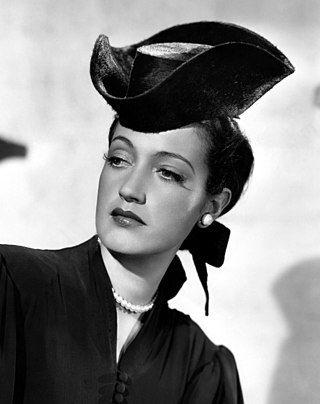
Dorothy Lamour was an American actress and singer. She is best remembered for having appeared in the Road to... movies, a series of successful comedies starring Bing Crosby and Bob Hope.
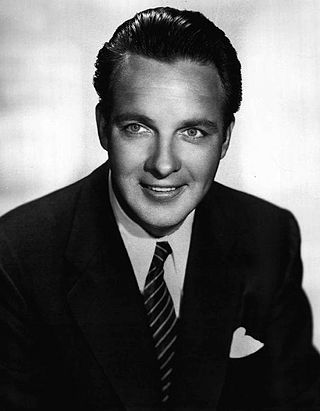
George Robert Crosby was an American jazz singer and bandleader, best known for his group the Bob-Cats, which formed around 1935. The Bob-Cats were a New Orleans Dixieland-style jazz octet. He was the younger brother of famed singer and actor Bing Crosby. On TV, Bob Crosby guest-starred in The Gisele MacKenzie Show. He was also a regular cast member of The Jack Benny Program, on both radio and television, taking over the role of bandleader after Phil Harris' departure. Crosby hosted his own afternoon TV variety show on CBS, The Bob Crosby Show (1953–1957). Crosby received two stars on the Hollywood Walk of Fame, for television and radio.
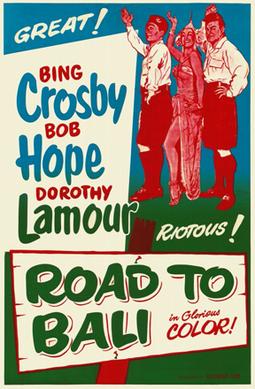
Road to Bali is a 1952 American comedy film directed by Hal Walker and starring Bing Crosby, Bob Hope, and Dorothy Lamour. Released by Paramount Pictures on November 19, 1952, the film is the sixth of the seven Road to … movies. It was the only entry in the series filmed in Technicolor and was the first to feature surprise cameo appearances from other well-known stars of the day.
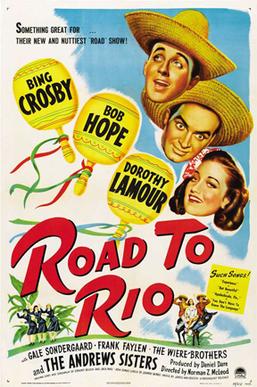
Road to Rio is a 1947 American semimusical comedy film directed by Norman Z. McLeod and starring Bing Crosby, Bob Hope, and Dorothy Lamour. Written by Edmund Beloin and Jack Rose, the film is about two inept vaudevillians who stow away on a Brazilian-bound ocean liner and foil a plot by a sinister hypnotist to marry off her niece to a greedy fortune hunter. Road to Rio was the fifth of the "Road to …" series.
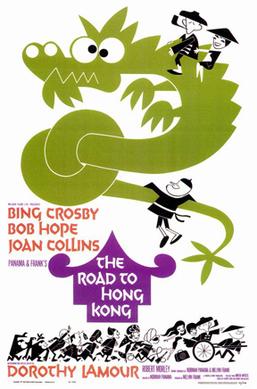
The Road to Hong Kong is a 1962 British semi-musical comedy film directed by Norman Panama and starring Bing Crosby and Bob Hope, as well as Joan Collins, with an extended cameo featuring Dorothy Lamour in the setting of Hong Kong under British Rule. This was the seventh and final installment in the Road to … series and the only one made without the involvement of Paramount Pictures, though references to the others in the series are made in the film and shown in Maurice Binder's opening title sequence.

John Elmer Carson, known as Jack Carson, was a Canadian-born American film actor. Carson often played the role of comedic friend in films of the 1940s and 1950s, including The Strawberry Blonde (1941) with James Cagney and Arsenic and Old Lace (1944) with Cary Grant. He appeared in such dramas as Mildred Pierce (1945), A Star is Born (1954), and Cat on a Hot Tin Roof (1958). He worked for RKO and MGM, but most of his notable work was for Warner Bros.
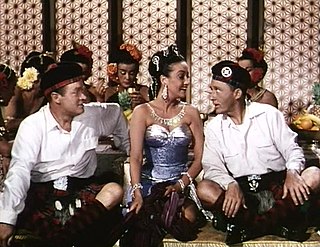
Road to ... is a series of seven comedy films starring Bing Crosby, Bob Hope, and Dorothy Lamour. They are also often referred to as the "Road" pictures or the "Road" series. The movies were a combination of adventure, comedy, romance, and music. The minimal plot often took a back seat to gags, which appeared improvised but were usually scripted.

Shirley Ross was an American actress and singer, notable for her duet with Bob Hope, "Thanks for the Memory" from The Big Broadcast of 1938. She appeared in 25 feature films between 1933 and 1945, including singing earlier and wholly different lyrics for the Rodgers and Hart song in Manhattan Melodrama (1934) that later became "Blue Moon."
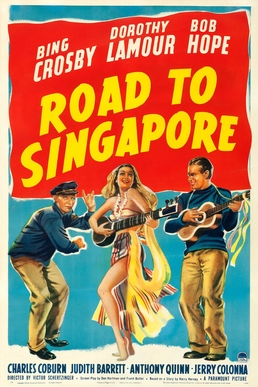
Road to Singapore is a 1940 American semi-musical comedy film directed by Victor Schertzinger and starring Bing Crosby, Dorothy Lamour and Bob Hope. Based on a story by Harry Hervey, the film is about two playboys trying to forget previous romances in British Singapore, where they meet a beautiful woman. Distributed by Paramount Pictures, the film marked the debut of the long-running and popular "Road to ..." series of pictures spotlighting the trio, seven in all. The supporting cast features Charles Coburn, Anthony Quinn, and Jerry Colonna.

Variety Girl is a 1947 American musical comedy film directed by George Marshall and starring Mary Hatcher, Olga San Juan, DeForest Kelley, Frank Ferguson, Glenn Tryon, Nella Walker, Torben Meyer, Jack Norton, and William Demarest. It was produced by Paramount Pictures. Numerous Paramount contract players and directors make cameos or perform songs, with particularly large amounts of screen time featuring Bing Crosby and Bob Hope. Among many others, the studio contract players include Gary Cooper, Alan Ladd, Paulette Goddard, Ray Milland, William Holden, Burt Lancaster, Robert Preston, Veronica Lake, William Bendix, Barbara Stanwyck and Paula Raymond.

Harry Barris was an American popular singer and songwriter. He was one of the earliest singers to use "scat singing" in recordings. Barris, one of Paul Whiteman's Rhythm Boys, along with Bing Crosby and Al Rinker, scatted on several songs, including "Mississippi Mud," which Barris wrote in 1927.

Star Spangled Rhythm is a 1942 American all-star cast musical film made by Paramount Pictures during World War II as a morale booster. Many of the Hollywood studios produced such films during the war, generally musicals, frequently with flimsy storylines, and with the specific intent of entertaining the troops overseas and civilians back home and to encourage fundraising – as well as to show the studios' patriotism. This film was also the first released by Paramount to be shown for 8 weeks.
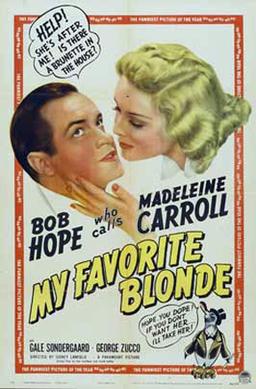
My Favorite Blonde is a 1942 American comedy film directed by Sidney Lanfield and starring Bob Hope and Madeleine Carroll. Based on a story by Melvin Frank and Norman Panama, the film is about a vaudeville performer who gets mixed up with British and German secret agents in the days just before the United States' entry into World War II. The film features an uncredited cameo appearance by Bing Crosby.

This is a filmography for the American singer and actor Bing Crosby.

They Got Me Covered is a 1943 American comedy thriller film directed by David Butler and starring Bob Hope and Dorothy Lamour. Otto Preminger appears in a supporting role. It also known by the alternative titles Washington Story and The Washington Angle.
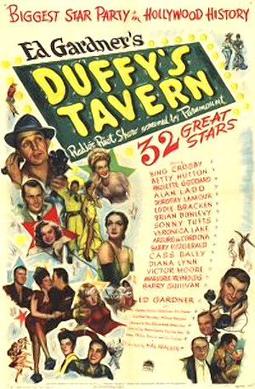
Duffy's Tavern is a 1945 American comedy film directed by Hal Walker and written by Melvin Frank and Norman Panama. The film stars Ed Gardner, Bing Crosby, Betty Hutton, Paulette Goddard, Alan Ladd, Dorothy Lamour, Eddie Bracken and Brian Donlevy. The film was released on September 28, 1945, by Paramount Pictures.

The Road to Hong Kong is a 1962 soundtrack album issued by Liberty Records from the film of the same name. The film starred Bing Crosby, Bob Hope, Joan Collins and Robert Morley with cameos from Frank Sinatra, Dean Martin, Dorothy Lamour, Peter Sellers and David Niven. Robert Farnon conducted the music for the film. All the songs were written by Jimmy Van Heusen (music) and Sammy Cahn (lyrics). Robert Farnon wrote four orchestral pieces for the soundtrack and these are annotated in the listing.
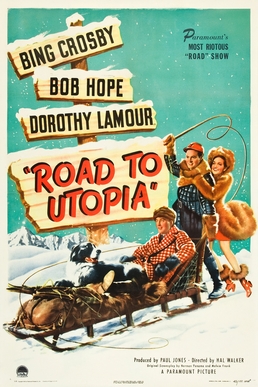
Road to Utopia is a 1946 American semi-musical comedy film directed by Hal Walker and starring Bing Crosby, Bob Hope, and Dorothy Lamour. Filmed in 1943 but not released until 1946, Road to Utopia is the fourth film of the "Road to ..." series. Written by Melvin Frank and Norman Panama, the film is about two vaudeville performers at the turn of the twentieth century who go to Alaska to make their fortune. Along the way they find a map to a secret gold mine. In 1947, Road to Utopia received an Academy Award nomination for Best Original Screenplay.




















